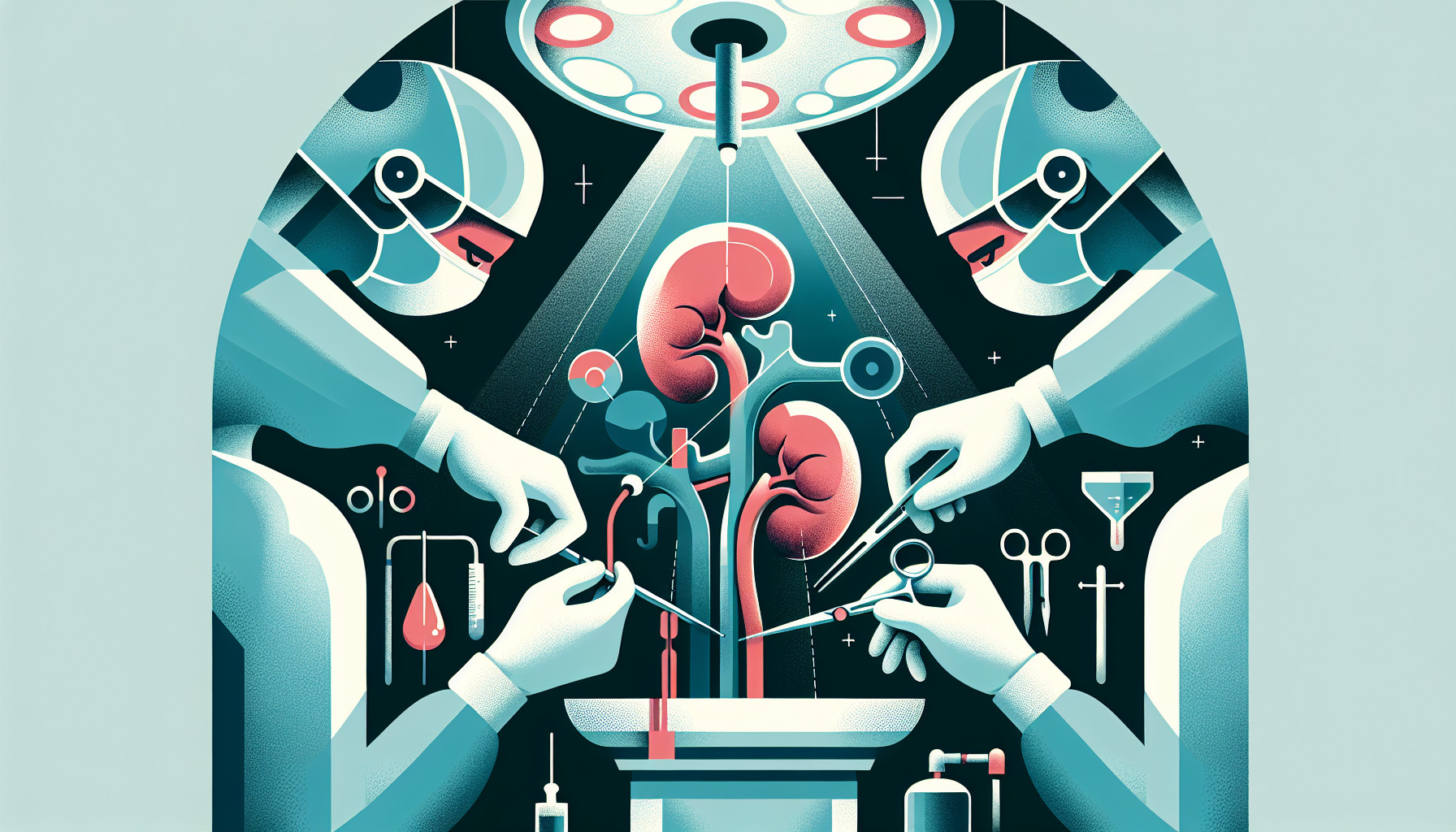Our Summary
This research paper is a review of studies that compare two types of kidney surgery: retroperitoneal laparoscopic partial nephrectomy (RLPN) and transperitoneal laparoscopic partial nephrectomy (TLPN). These are both minimally invasive techniques used to remove part of a kidney. The review aimed to determine which method is safer and more effective.
The researchers looked at a number of factors, including tumor size, how long the operation took, blood loss, time without blood supply to the kidney, length of hospital stay, whether the whole tumor was removed, the need to switch to open surgery, overall complications, and recurrence of the tumor.
They found 378 studies and narrowed it down to 10 that met their criteria. Out of these, 6 were used for a more detailed analysis. According to their findings, RLPN surgery was quicker and resulted in shorter hospital stays than TLPN. For all other factors, the two methods were pretty much the same.
So, in summary, both types of surgery are equally safe, but RLPN might be a little faster. This means hospitals can choose the best method based on their own preferences and experience.
FAQs
- What are the two types of kidney surgery discussed in the research paper?
- What factors did the researchers consider when comparing RLPN and TLPN surgeries?
- According to the research, which type of surgery is faster and results in shorter hospital stays?
Doctor’s Tip
One helpful tip a doctor might tell a patient about laparoscopic nephrectomy is to follow post-operative instructions carefully, including avoiding heavy lifting and strenuous activity for a certain period of time to ensure proper healing. It is also important to attend follow-up appointments to monitor recovery and address any concerns.
Suitable For
Typically, patients who are recommended for laparoscopic nephrectomy are those who need to have part or all of their kidney removed due to conditions such as kidney cancer, kidney stones, or other kidney diseases. Laparoscopic nephrectomy is a minimally invasive procedure that offers faster recovery times, less pain, and shorter hospital stays compared to traditional open surgery. Additionally, patients who are relatively healthy and do not have extensive scarring or previous abdominal surgeries may be good candidates for laparoscopic nephrectomy. However, it is important for patients to consult with their healthcare provider to determine if laparoscopic nephrectomy is the best treatment option for their specific condition.
Timeline
Timeline of patient experience before and after laparoscopic nephrectomy:
Before surgery:
- Patient undergoes preoperative testing and evaluation to ensure they are a suitable candidate for laparoscopic nephrectomy.
- Patient is given instructions on how to prepare for the surgery, including fasting before the procedure.
- Patient meets with the surgical team to discuss the procedure, potential risks, and expected outcomes.
During surgery:
- Laparoscopic nephrectomy is performed using small incisions and a camera to remove part of the kidney.
- The operation typically takes a few hours, depending on the complexity of the case.
- Blood loss is minimized during the surgery.
After surgery:
- Patient wakes up in the recovery room and is monitored closely for any complications.
- Pain medication is given to manage postoperative pain.
- Patient is encouraged to walk and move around to aid in recovery.
- Patient may stay in the hospital for a few days for observation.
- Follow-up appointments are scheduled to monitor healing and recovery.
Overall, laparoscopic nephrectomy offers a minimally invasive approach to kidney surgery, with shorter recovery times and less postoperative pain compared to traditional open surgery.
What to Ask Your Doctor
Some questions a patient should ask their doctor about laparoscopic nephrectomy include:
- What are the potential risks and complications associated with laparoscopic nephrectomy?
- How long will the surgery take and how long is the recovery time?
- Will I need to stay in the hospital after the surgery, and if so, for how long?
- What is the success rate of this type of surgery in removing the tumor completely?
- Are there any alternative treatment options available for my condition?
- Will I need to undergo any additional tests or procedures before the surgery?
- What can I expect in terms of pain management and post-operative care?
- How experienced are you in performing laparoscopic nephrectomies?
- What are the potential long-term effects or complications of this surgery?
- What is the likelihood of the tumor recurring after the surgery?
Reference
Authors: Fu J, Ye S, Ye HJ. Journal: Chin Med Sci J. 2015 Dec;30(4):239-44. doi: 10.1016/s1001-9294(16)30007-4. PMID: 26960305
